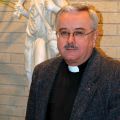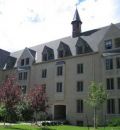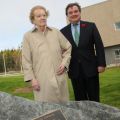For the French Catholic community in Sault Ste. Marie, Ont., the newly constructed École Notre-Dame-du-Sault will provide students with the sense of belonging necessary for preserving their French identity.
“The community really wanted us to unite all of our students at one site and offer students a high quality school where they get to start off in Kindergarden and finish off in Grade 12,” said Paul de la Riva, spokesperson for the Conseil scolaire catholique du Nouvel-Ontario (CSCNO). “The board’s main goal is to keep our students from Kindergarden to Grade 12.”
But that isn’t what had been happening in northern Ontario’s third largest city. While there are two elementary schools — École Cardinal-Léger and École Notre-Dame-des-Écoles which was expanded to become the new school — it had been renting space at a local Catholic secondary school to house its own high school.
De la Riva said this lack of independent identity caused many students to move to the English boards, either public or Catholic, when they entered Grade 9.
“All our schools weren’t really up to par, they were old schools and they really weren’t meeting the needs of the community,” he said. “When you’re renting a spot or area in another school you may have your own wing but you’re always looking at what the others are doing, the bigger section of the school. By having our students in their own building it will build a sense of belonging.”
That’s what prompted the five-year, $12.5- million project of renovating, expanding and rebranding École Notre-Dame-des-Écoles for which the province put forward $11.26 million, with the additional funds coming from the board’s budget.
It isn’t just CSCNO students who will benefit from this new building, which held its official opening ceremony on Oct. 26. Along with housing the more than 300 students from Junior Kindergarden to Grade 12, the building will also host the French-language adult learning centre and the Centre francophone de Sault-Ste-Marie, as well as play a supportive role for many off site organizations.
It is hoped this will help establish the new school as a hub for francophone pride.
“The school’s community component is something we hold dear and which will certainly contribute to its growth and to the vitality of the francophone community in Sault Ste. Marie and the Algoma District,” said Lyse-Anne Papineau, CSCNO director of education, in a news release. “We strongly believe that the new school will become a key City of Sault Ste. Marie partner for many years to come.”
Not only does the board hope that more students will remain pupils of its system, the board also hopes to attract new students to the francophone system with the modern school which has a capacity of 565 students. To help ensure success in maxing out this expanded capacity, the school houses a French-language day care program for up to 30 children.
“It’s really important to support the parents in preserving their language,” said de la Riva. “If children are not going to French schools, we know that one generation from now you’re losing many francophones who may have knowledge of the language but will not have the skills or capacity to really speak the language, transmit the language and culture to their kids.”
Toronto’s interfaith director to be honoured by Christian Jewish Dialogue
By Michael Swan, The Catholic RegisterTORONTO - For Christian Jewish Dialogue of Toronto, talk is precious and deserves to be honoured. With those values front and centre, the 50-year-old organization will honour two people who have fostered conversations about faith, trust and our future together.
Franciscan Friar of the Atonement Father Damian MacPherson and Holocaust Education Centre operations manager Mary Siklos will be feted by Christian Jewish Dialogue at a Nov. 26 dinner in Toronto. Cardinal Thomas Collins will be the keynote speaker for the dinner at the Adath Israel Congregation.
For MacPherson dialogue with Jews is precisely how we are called to be Catholic.
“It (dialogue) is not a choice we can arbitrarily make. It has become a responsibility we must assume,” he said. “The Church can only fully be the Church if it’s faithful to its Jewish roots. Knowing the texts is not sufficient. Knowing the people who believe and have preserved the texts, knowing the covenant, is what we’re called to.”
It’s just the second time Christian Jewish Dialogue has honoured an individual with a dinner. Two years ago Rabbi Erwin Schild was recognized for more than half a century of work on building understanding between Toronto’s Christians and Jews. The organization now hopes to make the dinners in honour of champions of dialogue an annual event.
“A lot of people start to question the need for dialogue at all,” said CJDT director Barbara Boraks. “We’ve got diversity in education, but we’re forgetting that everything comes down to personal relationships and knowing our neighbours.”
The behind-the-scenes people who make dialogue possible aren’t often honoured, but should be, she said.
“The event honours those relentless, grassroots workers who never get properly acknowledged or recognized,” said Boraks. “Damian fits that with bells on.”
“He has devoted his professional life to building bridges and working together and building understanding for each other,” said Siklos of MacPherson.
For more than a decade, MacPherson has been director of ecumenical and interfaith affairs for the archdiocese of Toronto. He was also the founding president of the Toronto and Area Interfaith Council. MacPherson’s job is a perfect fit for a Franciscan Friar of the Atonement — a religious order founded more than a century ago in the hope of ecumenical dialogue and Church unity.
“It’s terribly important that the public knows that these initiatives are happening — that the churches are working with synagogues and synagogues are working with churches and there are Jewish organizations reaching out to Christian organizations,” said Siklos.
Siklos runs the largest Holocaust education event in the world from her base at the Sarah and Chaim Neuberger Holocaust Education Centre of the United Jewish Appeal Federation. Toronto’s annual Holocaust Education Week has been imitated in cities across North America.
The 32nd annual Holocaust Education Week program ran to 44 pages of events — speakers, art exhibits, films and plays — from Nov. 1 to 8.
“She manages it in such a way that it stays human,” said Boraks. “She never lost touch with the grassroots people — the survivors — and they all love her.”
Tickets for the CJDT dinner are $40 and available by calling (416) 598-4242 or e-mailing info@cjdt. org.
University of St. Michael's College teaching assistants poised to strike
By Michael Swan, The Catholic RegisterTORONTO - University of St. Michael's College graduate theology courses, undergraduate classes, continuing education programs and help for students in writing labs will cease Nov. 15 unless the Catholic college at the University of Toronto can make a deal with the union representing academics who work under contract.
The Ontario Labour Board has issued a no board report and representatives of CUPE local 3902, Unit 4, claim negotiations have reached an impasse.
In a statement on its web site, St. Michael's College claims there is no impasse. Representatives of the college refused to speak with The Catholic Register about the situation.
Job security is the sticking point, said CUPE bargaining committee chair Daniel Bader. Teaching assistants and sessional lecturers work on contract of less than 12 months with no guarantee of future work, even though many have been teaching the same courses for years and the college has no plans to give those courses to higher cost full-time faculty.
"Really it's a matter of justice that when you have work that is continuous that you have employment that maps onto that," Bader said.
Academics like Bader, who teaches philosophy to graduate theology students, have trouble getting mortgages or even leases because they can't prove they will be employed beyond their contracts, he said.
The union is asking for right of first refusal if the course they are teaching is offered again.
St. Michael's College would not answer questions about how many students would be affected by a strike or lockout.
The college claims it has offered wage parity with University of Toronto for theology course instructors.
"There's a general situation in universities as a whole where an increasing amount of the work that's being done at universities is on short-term contract, even though the work is not short term," Bader said. "So you have employment that doesn't map onto the work. We're not saying that the courses need to continue. What we're saying is that if the courses continue we should continue in that work."
Multifaith council loses funding
By Michael Swan, The Catholic RegisterThe 40-year-old co-ordinating body for chaplaincy in Ontario will lose all of its provincial funding, nearly half-a-million dollars, as of March 31.
The Ontario Multifaith Council is working on a “transition plan” that may see it continue as a smaller organization focussed on lobbying for chaplaincy funding at Ontario hospitals, nursing homes and prisons.
The Ontario bishops, who only rejoined the organization this spring, would like to see the council continue past the provincial funding sunset, said Assembly of Catholic Bishops of Ontario general secretary Lou Poivesan.
“(The bishops) felt it was important to have a common voice on advocating for chaplaincy services, because across the province in hospitals and other institutions chaplaincy services certainly have, other than in Catholic institutions, they don’t seem to have a high priority,” Poivesan said.
There are 32 religious groups represented in the Ontario Multifaith Council, including Ontario’s Catholic bishops.
Since the province shut down all its large residential care facilities for people with disabilities in 2009, there hasn’t been as much demand for Ontario Multifaith Council services, said Ministry of Community and Social Services spokeswoman Charlotte Wilkinson.
“This resulted in the steady decline in need for services provided by the OMC as the organization had primarily been responsible for supporting chaplains in government facilities on religious matters,” Wilkinson wrote in an e-mail to The Register.
Ministry of Community and Social Services funding to the council for the year ending March 31 was $493,200.
The provincial government notified the council of the funding cut a year in advance to give the organization time to wind down or find other sources of funding, Wilkinson said, adding there’s no chance the ministry will reconsider funding the organization.
Over the years the Ontario Multifaith Council has published, in books and on its web site, information about spiritual practices and beliefs of various religions. It also runs seminars for chaplains and volunteers and maintains regional multifaith committees. The Toronto-based organization maintains a library for chaplains seeking information about minority religions and cultural practices. The government saw this as needless duplication of information that was already available in libraries, on the Internet and directly from religious organizations.
In 2004-2005 the Ontario bishops withdrew from the council over its activities promoting cultural tolerance rather than ensuring qualified chaplains are available and supported in all institutions. In April 2005 the bishops suspended indefinitely its membership in the organization. In 2010 it revived an “observer status,” looking for assurance the organization would be more focussed on chaplaincy.
With budgets tightening, particularly at hospitals, the bishops believe the future role for the council will be as a united voice advocating for professional chaplaincy, said Poivesan.
“I don’t think everything should be devolving to volunteers to provide those services,” he said.
No one from the Ontario Multifaith Council was available to speak with The Register.
Antigonish clears its abuse debt
By Catholic Register StaffANTIGONISH, N.S. - The diocese of Antigonish in Nova Scotia no longer owes $16 million to 125 victims of clerical sexual abuse.
The diocese has made its final payment to settle a class-action lawsuit, the Canadian Press reports. The settlement was negotiated by former Bishop Raymond Lahey, who was arrested on charges of importing child pornography just three weeks after announcing the deal to settle claims dating as far back as the 1950s.
The lawsuit was initiated in 2002 by Ron Martin, whose brother committed suicide that year leaving a note about abuse he suffered at the hands of Fr. Hugh Vincent MacDonald. MacDonald was charged in 2003 but died before his trial could come to a conclusion.
The last payment is not the end of the process of healing, said diocesan spokesman Fr. Don MacGillivray.
“Healing always takes time,” MacGillivray told the Canadian Press. “But I’m a person of hope, and that’s what my faith calls me to be.”
The diocese put 150 properties up for sale, dumped its shares in the local weekly paper, The Casket, and drained savings from parishes to come up with the full settlement.
Cape Breton University honours pioneering nun
By Catholic Register StaffSYDNEY, N.S. - Cape Breton University recognized the contributions of Sr. Margaret Harquail to the school’s business program by naming a garden space in her honour.
Harquail Gardens is the new name of the space between the Verschuren Centre and the Shannon School of Business.
“Just as it is important for our university to progress, it is equally important for us to recognize those who have been instrumental to our success,” said Dr. John Harker, Cape Breton University’s president. “Sr. Harquail had a vision for our fine business school, and through hard work and commitment she helped shape the school into what it is today. The Harquail Gardens will be a lovely reminder of Sr. Harquail’s spirit and her contribution to the business community.”
Harquail established the School of Business Administration at the University College of Cape Breton, as well as the Canadian Institute of Management (CIM) certificate program. Harquail was also instrumental in establishing the College of Cape Breton as a university.
On hand for the ceremony was Minister of Finance Jim Flaherty, Harquail’s nephew.
Axing chaplains puts prisoners at risk
By Michael Swan, The Catholic RegisterFinding a home, a job, a purpose and peace for men who’ve spent most of their lives inside prison, addicted, raging and lost is never going to be easy. But Curtis Wiebe, who has spent 23 of his 45 years inside, has a suggestion for Public Safety Minister Vic Toews: Don’t cut programs that work.
When Correctional Services Canada decided in October not to renew the contracts of 49 part-time chaplains working in Canada’s federal prisons, it also meant cutting the programs they run — including the one that has helped Wiebe turn his life around.
As Wiebe neared release he moved from the maximum security Stoney Mountain institution near Winnipeg to the nearby minimum security Rockwood prison. In Rockwood he began meeting with a group led by part-time chaplain Sr. Carol Peloquin. The group called Next Step helped prisoners deal with the prospect of life on the outside in practical ways — driving them to appointments, finding a doctor, reconnecting with family when possible. It also selected a few men who both needed and wanted a supportive environment to live at Quixote House.
That’s where Wiebe is now, living with two Jesuit priests and four other parolees in an environment free of drugs and other negative influences, working on finishing high school, making plans for life beyond prison.
“I just couldn’t take it any more. If I had to come back (to prison) then my life’s over kind of thing,” said Wiebe. “And I like life, so I decided to stay out.”
But without Next Step and the part-time chaplain who runs it, staying out will be infinitely harder. Without Next Step there’s no path into Quixote House. Without Quixote House all Wiebe could afford on his disability pension would be a rooming house on the rough north side of town where drugs and alcohol are a constant presence.
There have been 67 men through Next Step over the last five years and three have gone back to jail for parole violations. All three were addicts and two were mental health patients. It’s a pretty good track record, said Next Step originator Peloquin.
“Quite a number of them are law-abiding citizens who would have jobs and are paying taxes, who wouldn’t be scaring the public,” she said.
The Jesuits and the Sisters of the Holy Name of Jesus, Peloquin’s community, are in the process of adding a third step to the supportive process of reintegration they’ve built on the Next Step program. Next door to Quixote House they are renovating an old crack house to create individual apartments to be known as the Massey Apartments — named after Jesuit Father Brian Massey who was a prison chaplain in Jamaica and Canada. Once complete, graduates from Quixote House will have a chance to try out independent living in their own apartment, but still with the support of Next Step.
Remove Next Step and the whole structure comes crashing down.
Correctional Services Canada gassed the $1.3 million-a-year part-time chaplain program without first working out what happens to the associated programs.
“A decision has yet to be made about all services that are connected with part-time chaplains,” reads an e-mail to The Catholic Register from the CSC media relations staff. “CSC is consulting with its various partners between now and the end of March 2013 to solicit their feedback and discuss the implementation of the full-time model of chaplaincy services.”
The Canadian bishops have kept their heads down while they quietly engage the federal prison service on a plan B.
“It would be sort of imprudent for us to comment,” said Whitehorse Bishop Gary Gordon, who acts as the liaison of prison ministry for the Canadian Conference of Catholic Bishops. “I know the commissioner and I know the chaplain management are working very hard to come up with viable options and alternatives and modalities of doing ministry.”
Central to the negotiations on how to do prison ministry without 49 part-time contract holders will be maintaining a memorandum of understanding between faith groups and CSC which stipulates the equivalent of one full-time professional chaplain for every 150 to 200 inmates.
So far Correctional Services has been talking up the 2,500 volunteers who contribute to chaplaincy.
Kathleen Mico, who earlier this year took over Next Step from Peloquin, is concerned that the dozens of volunteers she works with won’t have a program to volunteer for. It’s Mico, as the professional trained by Peloquin, who co-ordinates the volunteers for Next Step. If CSC takes away Mico, what will the volunteers do?
Given that just one prisoner in Stoney Mountain costs taxpayers about $100,000 per year, a program that keeps men out of prison on a quarter-time salary and two dozen volunteers is a pretty good deal, said Mico.
Not all groups affected by the decision to axe the chaplains are taking the behind-the-scenes approach of the Canadian bishops. Full-time federal prison chaplains are calling the decision a breach of non-Christian prisoner rights. Only one of the 80 full-time chaplains working in the federal prisons is not Christian.
While Toews claims a professional chaplain should be capable of serving the entire population regardless of religious affiliation — just as military chaplains do in the armed forces — Rev. Lloyd Bruce, full-time chaplain at the medium security Springhill Institution in Nova Scotia, isn’t buying it.
“Taking away professional chaplains of other world faith traditions is taking away hope from others who are struggling to turn their lives around,” Bruce wrote in a letter to Toews.
“Your decision not to renew part-time contracts with faith communities for provision of chaplaincy services with Correctional Service Canada will essentially eliminate chaplaincy services for non-Christians,” wrote the Moderator of the United Church of Canada Rev. Gary Paterson.
While the decision affects Buddhists, Jews, Jains and others who won’t have access to their own clergy unless those clergy volunteer, the 40 per cent of federal prisoners who are Catholic will be hit harder, said Gordon. Lay and Protestant chaplains may be very good counsellors and advocates for prisoners, but they can’t hear confessions, celebrate Mass, anoint the sick. Catholic canon law defines a chaplain as a priest.
Since 1975 Canada has endorsed the United Nations Standard Minimum Rules for the Treatment of Prisoners, which guarantees prisoners the right to access their own clergy. But that minimum standard is no help when it comes to maintaining the part-time chaplains.
“We’re quite aware that the government is under no obligation to pay for it. They are under an obligation to open the doors, access,” said Gordon.
Mico is one of just two part-time prison chaplains whose contract extends beyond next spring. But when her contract runs out in 2014 she’ll have to find another job. She simply can’t keep co-ordinating Next Step for free.
As the Catholic bishops look for solutions their primary interest is in maintaining service to prisoners, said Gordon.
“I can quite honestly and definitively say that as a Catholic Church we serve people. If we can get the remuneration to put those things in place, then we can serve them better,” he said.
MP invites civil society to join the fight against human trafficking
By Deborah Gyapong, Canadian Catholic NewsOTTAWA - It is one thing to set victims of human trafficking free but quite another to get them started on a new life.
“They believe they are good for nothing,” said Conservative MP Joy Smith. “This is so wrong. It breaks my heart. A lot of these girls were lost and had no support to get back on their feet.”
With that in mind Smith has launched a foundation to invite the public to participate in the fight against human trafficking.
The Joy Smith Foundation is a registered, non-profit organization where “every red cent goes to the victims and the NGOs that take care of them,” Smith said.
The foundation is a follow-up to the federal government’s National Action Plan to Combat Human Trafficking announced in June 2012. Non-political and non-partisan, the foundation is all about the victims,, Smith said.
Victims are “so traumatized they need support” to “start their lives again,” she said. They “need a vision” to rebuild their lives.
“I’m trying to be a role model for the public to show them what they can do,” Smith said. The money goes to the victims to provide rehabilitation to prepare them for a new life outside the sex trade; for clothing, counselling, housing, and money, “all those important everyday things.”
She recalled the court testimony of one trafficking victim who said she felt “good for nothing except giving sex to men.”
The foundation’s other component is building awareness of the plight of trafficking victims and the “unsung heroes” among police officers who rescue them and the NGOs that look after them, Smith said. “These people need to be thanked.”
Smith said people do not realize how hard it is to work in the human trafficking field and the kinds of blocks one runs into, from “judicial blocks” to the blocks from one’s peers in the police force. The work can be discouraging and depressing because the damage to trafficked women and children is so horrible, she said.
“It’s all about love, your love for girls and a desire to give them a fresh start,” she said.
Smith is the first MP in Canadian history to cause amendments to the Criminal Code twice through private member’s bills. Bill C-310 added a mandatory five-year sentence to those convicted of trafficking children under 18, and C-268 made human trafficking an extra-territorial offence, allowing prosecution of Canadian citizens or residents for trafficking crimes committed in other countries.
More information about the foundation can be found at www.joysmithfoundation.com
Pro-lifers must adapt their message, MPs say
By Evan Boudreau, The Catholic RegisterTORONTO - Political lobbying is not just about what you say, it’s how you say it, according to a pair of Conservative MPs. That was just one of the tips Stephen Woodworth and Brad Trost gave to those attending the National Pro Life Conference.
“Although I am in Parliament, I happen to believe that the world does not stop and end inside the House of Commons,” said Woodworth, MP for Kitchener Centre. “The real important work that needs to be done is outside the chamber of the House of Commons.”
Much of this has to do with language and scope, Woodworth told those attending the third and final day of the conference hosted by Alliance for Life Ontario in Toronto Oct. 25-27.
Woodworth said too many MPs are pre-occupied with the word abortion. By adjusting the language and widening the scope of the message, the pro-life movement will garner more support by avoiding sensitive words — something Woodworth admits is easier said than done.
“People don’t necessarily take away from words the meaning that I take away from them,” Woodworth said. “We have members of Parliament who are actually suggesting, in relation to Motion 312, that the Prime Minister should have a veto over the independence of backbench MPs.”
Woodworth said some MPs “couldn’t see the democratic tradition and the value of backbench independence” and “they were willing to sacrifice because of their pre-occupation with the word abortion.”
Although Motion 312 — Woodworth’s motion for a debate on when life begins — did not mention the word abortion, it led to its failure.
But Woodworth does not completely blame the failure on those MPs pre-occupied with abortion — pro-lifers are at fault too for not being able to adapt how they communicate their message.
“If you simply go in with your truth and you fail to recognize the truths that others are concerned about, you won’t make that connection, you won’t develop that relationship and you won’t be listened to,” he said. “If you cannot convince someone that a child is a human being before birth you are not going to convince them about abortion.”
While Woodworth focused heavily on how to convey the message, Trost addressed how to understand a politician’s position on the pro-life cause.
“The weakest link in Canada’s pro-life movement has been political,” said Trost, MP for Saskatoon-Humboldt. “In Canada we know the political aspect is very important and the political aspect needs to change and evolve and we need legislation to start moving it forward.”
As a Liberal turned Conservative, but a constant pro-life supporter, Trost cautioned the audience to never assume which way a politician will vote.
“People don’t actually know what they’re voting for or what they’re voting on (when electing politicians),” said Trost.
“Politicians can do one thing in Ottawa and another thing in the constituency. People are shocked when they find that out.”
He continued by stressing the importance of checking an MP’s voting records to see who stands strongly on either side of the issue, but also exposes those in the middle who’d be easier to influence.
“If you don’t know where your MP has voted, get involved, talk to them. A lot of these people who have come in from professional careers may not have fixed views. "
Pro-life activist Linda Gibbons counts on Christ’s strength
By Deborah Gyapong, Canadian Catholic NewsOTTAWA - Pro-life activist and Queen’s Diamond Jubilee Medalist Linda Gibbons is back in prison, certain she is doing God’s work for praying outside an abortion facility.
Police moved in and arrested her Oct. 30 after the 64-year-old great-grandmother prayed outside of the Morgentaler abortuary on Hillsdale Avenue in Toronto, breaking a temporary injunction prohibiting demonstrators from coming too close to the facility and impeding its business.
Gibbons carried her usual sign depicting a picture of an infant and the words: “Why Mom? When I have so much to give.” Police moved in after about an hour and a half and arrested Gibbons.
“We will remain free in our love, we will not be coerced by the government to turn our backs on the unborn child,” Gibbons told CCN in an exclusive phone interview from Toronto days before her latest arrest. “If that lands us in court, that’s a gift, another providential opportunity to do the Lord’s work.
“When hoping and praying become a criminal activity, where is our freedom?” she asked.
Gibbons said her fellow inmates often ask her how she can stand the confinement, and being away from her family.
“I always tell the girls, ‘One day at a time with Jesus.’ It is Christ’s strength that gives you that fortitude to persevere,” she said.
The injunction dates back to 1989 after the former Morgentaler clinic on Harbord Street was firebombed.
Morgentaler built a bigger and more secure facility at the Hillsdale Avenue location that is covered by the temporary injunction creating a bubble zone around it.
Gibbons recalled the first time she was arrested. She and some fellow pro-lifers were in the alley behind the facility praying in a circle. They were not blocking the entrance or talking to people or doing anything that might impede Morgentaler’s business operation, she said.
She knew she would lose her job at military headquarters if she was arrested. But the words of Christ in the Garden of Gethsemane came to her: “Can you not pray with me for one hour?” She realized her job “is something I must lay down.”
“Anything I put before Christ is not where I should be at the moment,” she said. “Doing the will of Christ is my first duty and the duty of the moment.”
In between arrests Gibbons used to try to get a job so as to maintain her apartment, but she realized hanging onto her home or an income was unrealistic.
“For 20 years, I have had no government support; I’m on no government program,” she said. “Pro-lifers have are carrying me through.”
A great-grandmother of two, Gibbons does miss her family when she’s in prison.
“I see this as a cost of doing business with the government,” she said. “I’m trying to leave a legacy for my grandchildren, so they don’t have to live in a society burdened by abortion.”
Notre Dame sisters on the move
By Vanessa Santilli-Raimondo, The Catholic RegisterTORONTO - When Angela Farrell was unsure about a career change, she turned for guidance to the sisters at the Notre Dame convent in Toronto.
“I think of the convent as the North Star,” she said. “This is the true north and you orient from there.”
So she is saddened now to learn that her North Star will soon be dark. After 60 years, the convent on Kingston Road in Toronto’s east end is closing.
The packing has already begun and the nuns, several in their 80s, are to all be moved by next August, although the date is not set in stone, says Sr. Eileen Power. She is clear the sisters are not leaving Toronto, but will cease to live in community as they move to other locations in the city.
“We have been engaged in a process of long-term planning for some time now in our congregation and in our province and many other communities are doing this too,” said Power, the local house leader. “The location is no longer meeting our housing needs.”
The convent and property will be sold but Power said she has no idea who the buyer will be.
“Only God knows that right now,” she said.
The convent has housed up to 20 people but is currently home to just 11 sisters, some of whom have lived there more than 40 years. The youngest is in her early 40s but most are retired. There are about two dozen Notre Dame sisters living in Toronto, said Power.
“The sisters here are looking to the future with hope and courage and they are hearing God’s call in this,” she said.
When Farrell was growing up in the neighbourhood, the convent was a much busier place. The Sisters of the Congregation of Notre Dame provided teachers for many east-end Catholic schools and, in 1941, founded Notre Dame High School, which still operates nearby the convent. Farrell almost always lived close to the sisters. A graduate of Notre Dame, she has taught religion and belonged to the chaplaincy team at the school the past 12 years.
“My whole growing up was shaped by the presence of the sisters and there was always a sense of structure and security in knowing they were there,” she said.
The order has been in Toronto for 80 years. The first nuns arrived in 1932 at the invitation of Archbishop Neil McNeil to bolster Toronto’s Catholic teaching community, originally settling in a convent near St. Brigid’s Church. Over the years, the sisters taught in more than 20 elementary schools and several high schools. They’ve also been active in parishes through outreach to the poor, catechetics, retreats and social justice initiatives.
As their numbers increased, and after Notre Dame High School was built, the sisters obtained a plot of land near the school for a convent. It has been occupied since 1952 but, with vocations in dramatic decline, some difficult decisions were required.
“I think most families experience this,” Power said. “The kids grow up and move away and three or four bedrooms are empty and the parents say, ‘We need to do something now.’ We don’t have a lot of younger people at the moment here in Toronto.”
Power said it is important that the order prudently manage its resources.
“We pool our resources as sisters and then we support people who are doing other ministries,” she said, highlighting activities for social justice in Central America, Africa, Japan, France, the United States, as well as across Canada.
Nancy Devitt-Tremblay, a Notre Dame graduate (class of 1974), says the sisters gave the incredible gift of education to her mother’s generation.
“My mother grew up in an inner-city parish at a time when her brothers didn’t go to high school,” said Devitt-Tremblay, a teacher at Senator O’Connor College School. “If Notre Dame hadn’t opened, she probably wouldn’t have had a high school education.”
Ursula Thomson was a part of that generation. One of 16 members of the first graduating class in 1944, she keeps in touch with Notre Dame nuns almost 70 years later. She is grateful for the kindness, intelligence and devotion of the sisters.
The relocation process for the 11 nuns still in the convent will be co-ordinated between the leadership and administrative team in Halifax, Power said.











